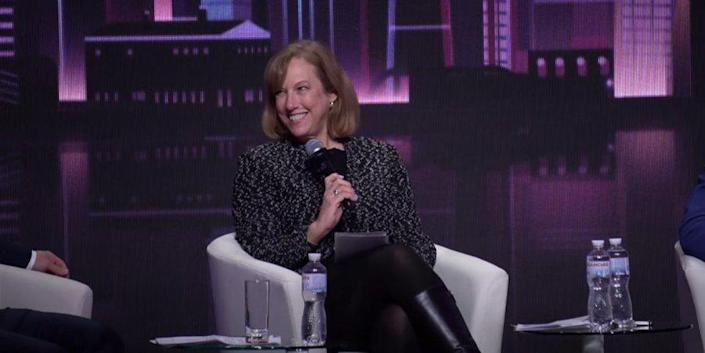
Read also: Zelensky refutes Russian propaganda claim that Azov Regiment is ‘neo-Nazi’
NV: I’d like to start with Russian propaganda. So, we see at the moment messages like “you should not arm Ukraine because it will only escalate the conflict” or “you should not impose sanctions on Russia. It will stop Putin, but Europe will suffer.” And those are like the main stances of Russian propaganda right now. Do you have any explanation why even European leaders like (German Chancellor) Olaf Scholz, use these thesis in public?
Kvien: Well, I don’t really want to speculate on what other world leaders are saying or thinking. But I can tell you that the United States does not listen to Russia’s propaganda or fake information.
Read also: Absolute ends with limited means: Putin’s self-deception
We certainly don’t let it influence us. And we certainly don’t believe it. And I think that most of the world also does not believe it, because I think that we, the international community and Ukraine, has done a good job of debunking this, you know, false information when it gets out there.
And it’s gotten to the point now where Putin lies so much that honestly, I don’t think I’ve heard a single true thing come out of his mouth since February 24.
So I don’t think the international community in general is falling for his blatant false information.
NV: Okay, but talking about sanctions. Do you think the US can help us impose an embargo on Russian gas and oil in Europe? Because we know this is such a crucial question right now, such a crucial topic. Do you think the U.S can help in any way?
Kvien: Well, you know, the United States has already embargoed oil, gas and coal from Russia.
Again with our partners in Europe, we encourage that they do whatever they can to sanction Russia and to restrict the amount of money that they take in.
Read also: Why Putin is blackmailing Europe with gas
On the other hand, we do have to be sensitive to the fact that Europe is much more dependent on Russian energy than the United States.
And we want to maintain unity among allies. So we try not to micromanage how other countries who have all said that they want to sanction Russia and crack down on Russia. We allow them to decide how will they do that. We don’t try to micromanage their decisions on sanctions policy.
NV: (Vladimir) Putin thinks that he can sit through the sanctions because he thinks his regime will last forever, while European or American leaders change every four to five years. Do you think there is any way that the sanctions imposed on Russia already can be lifted?
Kvien: Lifted? I find it difficult to see a future in which we lift sanctions under the current regime in Russia, of course. There could in some future time be a negotiation in which, we could discuss a warrant, a possibility. But right now, I just I don’t see that perspective. Certainly not in the short term anyway. And certainly not until Russia is out of Ukraine. And not until it stops its aggression.
In the meantime, though, I would say on sanctions, it’s important to know that of the sanctions that have been imposed, some of them have had immediate effect. Some of them do take longer to come fully into effect.
I would say first of all, we continue to look for ways to sanction Russia, we haven’t stopped. The second thing is that some of the sanctions we’ve already taken, will continue to ratchet up as they come into full force. I do think that the pressure on Russia’s economy is not going to decrease. It’s only going to increase in the coming months. And part of that is because some of the sanctions that we’ve applied, do take some time to fully take effect.
And we certainly have no intention of lifting up any of the financial pressure on Russia. And in fact, we’ll continue to look for ways to increase the financial pressure.
Talking about sitting through, Putin is already in power for 22 years, and he believes he’ll stay there, you know, for many, many more.
NV: A couple of days ago, Kyiv was attacked by Russian missiles while UN Secretary Antonio Guterres was in town. Ukrainian journalist Vira Hyrych was killed. Could you say this will be like a wake-up call for the UN to exclude Russia from UN Security Council?
Kvien: Ultimately, what the UN decides to do is up to the body of the UN. The United States is a member, obviously, but we’re not the only member.
Read also: Russia launched five missiles at Kyiv late on April 28, says Zelensky
Certainly, I do think that the United States is seeking to minimize Russian influence in all international organizations, and in some cases, remove Russia altogether. I think you’ve already seen that happen in some bodies like UN Human Rights Council and that’s something that we’ll continue to look at and assess going forward.
NV: Do you have any insights about the how Russian elites perceive the war in Ukraine? Are they still united around Putin? Because we have different reports from international media, and we see that they are not happy, but they still stand with Putin.
Kvien: I don’t know that many Russian elites. But I would say that from the information that I have, and a couple of conversations I’ve had, it seems to me that Russia’s elites are scared. Obviously, President Putin is very vindictive. When people speak against him, they often find themselves falling out of windows or being poisoned by a nerve agent.
Read also: Fridman maintains that Russian oligarchs have no influence over Putin
I do think that there’s some intimidation going on. And I also think, of course, these guys like their money, I don’t think they want to lose their money. You know, I haven’t seen a lot of bravery among them, and a lot of, you know, standing for the right thing. It’s too bad.
But like I said, I don’t know a lot of them personally. So, I can’t comment exactly on what their motivations are. I do believe when Russian oligarchs say that they cannot influence Putin in any way, that this is true.
Hard, hard to say. My guess is some of them could influence more than others. And of course, I think that everybody who stands for freedom, for rule of law and doesn’t condone torture, and illegal annexation of territory, should be standing against President Putin. And if they don’t, then I must assume that it’s their own personal interests that they’re looking out for doing and not doing so.
NV: Do you believe in diplomatic ways of negotiating things with Putin? Because after all the atrocities we’ve seen in Bucha, Borodianka, Mariupol, and many other places that some of them we haven’t reached yet…Do you believe that it’s possible to end this war with some kind of a peace treaty?
Kvien: Well, my understanding is that Ukrainian negotiators do continue to talk to the Russian side. I hear from their reports that there hasn’t been a lot of progress so far. But of course, if they continue to talk, we will support the Ukrainian side in any way we can.
And ultimately, if negotiations can lead to an acceptable settlement for Ukraine, then, you know, I’m certainly not going to say that I wouldn’t support a diplomatic solution.
I think we leave it to Ukraine to make the decision on how, when and on what level to do negotiations, and we have trust in them that Ukraine will know how to look after its interest in those negotiations.
NV: Experts gave like 48 to 70 hours until Ukraine falls (at the start of the war). What was the plan of U.S. diplomats in case that really happened?
Kvien: I don’t want to speculate on what might have happened or what we might have done if it did happen. It didn’t happen. And that’s I’m very happy it didn’t happen. The Ukrainian people, the Ukrainian military, the Ukrainian government showed that it was incredibly strong and incredibly resilient, and frankly, much more flexible and innovative than the Russian side. All these things contributed to Ukraine being able to fight back against Russia. I would add, though, that I feel like we also did contribute to that because we had been flowing weapons into Ukraine before Russia attacked.
Read also: Genocide in Ukraine: Putin just gave his tacit approval for more war crimes
Maybe it was a week and a half before the invasion, I was at plane side at the airport welcoming a big, big load of Javelins and other things. And so, while I put most of the credit on the on the Ukrainian people and Ukrainian soldiers, I would say at least a small amount was because United States had started providing weapons even before Russia attacked.
And then of course, once Russia did attack, we continued to provide weapons and as we talked about earlier, we’ve been ratcheting up those weapons based on the situation on the ground, and request by Ukrainians.
NV: You worked in the U.S. Embassy in Moscow in mid 2000s. What was your experience there like? What kind of Russia did you see? Because it was like the beginning of the Putin (era).
Kvien: I was. Most of the time I was there, Medvedev was leading. I mean, I’m not sure how much he was actually leading, but at least on paper he was. And I think back then we did have more scope for cooperative relations. I worked in the environment, science and technology area, where politics was a little bit less prominent. So, I was able to do some work there, which I thought was important work. But frankly, I left Russia about two weeks after they invaded Georgia. And I would say that from then on, relations have become increasingly difficult and now obviously, they’re not good at all.
Read also: Soviet identity is gone forever, but Putin doesn’t get it
I think it’s unfortunate that Russia went the way it went. But ultimately, you know, I put the blame squarely on President Putin, who took the country in a direction away from good relations with its neighbors away.
Away from good relations with the West, from good relations with you know, the other primary countries in not just Europe, but around the world.
And I think it’s unfortunate because I think Russia…I don’t have bad feelings about Russia as a country. And I think it’s sad and unfortunate that President Putin has taken them in such a bad direction.
NV: What do you think was our collective mistake about Putin? Why had we underestimated him? I mean, I’m talking about Ukraine. I’m talking about Europe. I’m talking about the US – all of us, you know. So, what do you think we did not understand about him?
Kvien: Unfortunately, I think President Putin has taken the same route of many other autocrats. They start out there, fairly balanced and reasonable, but the longer they’re in power, the more myopic they become.
Read also: Not just Putin: Most Russians support the war in Ukraine
You’ve seen it in history. I think that President Putin has taken the route of some other horrible autocrats who have done some very horrible things in their time in office. I can’t talk to President Putin’s psychology.
I don’t know what’s in his head, but I can say that the level of depravity that he has brought to this senseless attack on Ukraine clearly shows that he has gone the way of some of the worst autocrats in history. And I think history will judge them that way. And we’ll put him in the in a group with a small other group of horrible, horrible autocrats.
NV: The last question that I have is about your successor, Bridget Brink. What do you think we should expect from her?
Kvien: I’ve known Bridget for about 15 years, when she and I worked together, when I was at the National Security Council and at the White House. She’s terrific. She’s energetic. She’s smart. She’s very pro-Ukrainian. And she’s a strong advocate for Ukraine, and for Western integration for Ukraine. I think she’ll be a terrific ambassador, and I think that you’ll enjoy working with her.
Read also: Day 69 of Putin’s war. Russia starts storming AzovStal, attacks Lviv




